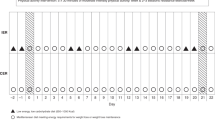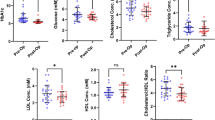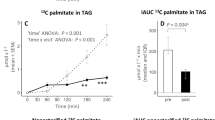Abstract
Objective: Cachexia and weight loss are frequently seen in cancer patients. We investigated lipid metabolism to elucidate a metabolic basis for adequate nutrition of cancer patients.
Design: Lipid metabolism was assessed by indirect calorimetry and triglyceride clearance rates after randomised injection of a lipid bolus (long-chain triglycerides (LCT) or medium-chain triglycerides (MCT) during an euglycemic clamp protocol in cancer patients.
Setting: Rudolf-Virchow Krankenhaus, Berlin, Germany.
Subjects: Eighteen patients were included. Twelve patients had upper gastrointestinal cancer: a weight stable cancer group (Caws, n=6) with a body mass index (BMI) of 22.9±1.7 kg/m2 and a weight losing cancer group (Cawl, n=6) with a mean weight loss of 7.4±3.1 kg or 11% of the initial body weight during the previous three months (present BM1 21.8±0.8 kg/m2). The data were compared with six control patients with benign gastrointestinal diseases (BMI=25.0±0.8 kg/m2).
Main outcome: Cancer patients had an increased basal lipid oxidation rate that was more pronounced in Cawl (+92% vs +42% in Caws; P<0.01 and 0.05 vs controls, respectively). Utilisation of LCT was increased in cancer patients, this was most pronounced in Cawl (+150 vs +65% in Caws; P<0.01 and 0.05, respectively). Metabolically, there were no differences in the utilisation of LCT and MCT/LCT containing lipid emulsions.
Conclusions: Cancer patients have an increased lipid oxidation and an enhanced utilisation of exogeneous lipids. This is most pronounced in Cawl. To prevent further weight loss or to increase body weight, they should increase their fat intake. In contrast, fat-reduced or prudent diets seem to be inadequate for the nutrition of cancer patients.
Sponsorship: Else-Kröner-Fresenius Stiftung, Bad Homburg, Germany.
This is a preview of subscription content, access via your institution
Access options
Subscribe to this journal
Receive 12 print issues and online access
$259.00 per year
only $21.58 per issue
Buy this article
- Purchase on Springer Link
- Instant access to full article PDF
Prices may be subject to local taxes which are calculated during checkout
Similar content being viewed by others
Author information
Authors and Affiliations
Contributions
Guarantor: Prof. Dr MJ Müller
Contributors: Contribution of each author: J Körber designed and coordinated the study, he also analysed and interpreted the data; S Pricelius performed the tests, acquired and analysed the data; M Heidrich, performed the tests, acquired and analysed the data; MJ Müller co-designed the study, gave his experience to establish the methods, interpreted the data and wrote the manuscript.
Corresponding author
Rights and permissions
About this article
Cite this article
Körber, J., Pricelius, S., Heidrich, M. et al. Increased lipid utilization in weight losing and weight stable cancer patients with normal body weight. Eur J Clin Nutr 53, 740–745 (1999). https://doi.org/10.1038/sj.ejcn.1600843
Received:
Revised:
Accepted:
Published:
Issue Date:
DOI: https://doi.org/10.1038/sj.ejcn.1600843
Keywords
This article is cited by
-
Characteristics and clinical significance of lipid metabolism in patients with gastrointestinal stromal tumor
Lipids in Health and Disease (2022)
-
The burning furnace: Alteration in lipid metabolism in cancer-associated cachexia
Molecular and Cellular Biochemistry (2022)
-
Is there a role for carbohydrate restriction in the treatment and prevention of cancer?
Nutrition & Metabolism (2011)
-
The “parallel pathway”: a novel nutritional and metabolic approach to cancer patients
Internal and Emergency Medicine (2011)
-
Plasma and neutrophil fatty acid composition in advanced cancer patients and response to fish oil supplementation
British Journal of Cancer (2002)



